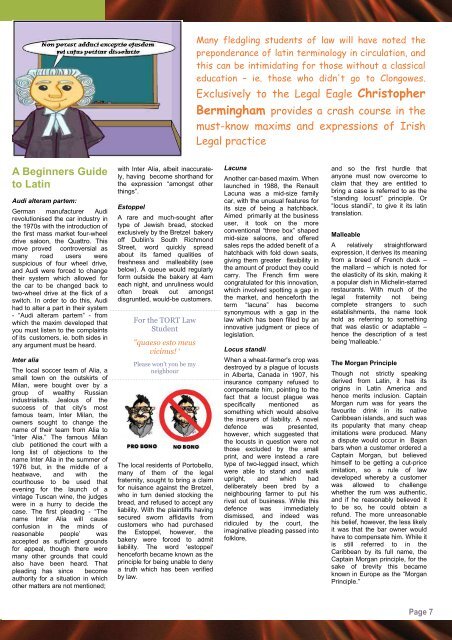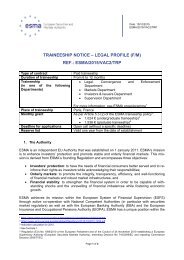The Legal Eagle Issue 2 2013-2014
The Legal Eagle Issue 2 2013-2014
The Legal Eagle Issue 2 2013-2014
Create successful ePaper yourself
Turn your PDF publications into a flip-book with our unique Google optimized e-Paper software.
Many fledgling students of law will have noted the<br />
preponderance of latin terminology in circulation, and<br />
this can be intimidating for those without a classical<br />
education – ie. those who didn't go to Clongowes.<br />
Exclusively to the <strong>Legal</strong> <strong>Eagle</strong> Christopher<br />
Bermingham provides a crash course in the<br />
must-know maxims and expressions of Irish<br />
<strong>Legal</strong> practice<br />
A Beginners Guide<br />
to Latin<br />
Audi alteram partem:<br />
German manufacturer Audi<br />
revolutionised the car industry in<br />
the 1970s with the introduction of<br />
the first mass market four-wheel<br />
drive saloon, the Quattro. This<br />
move proved controversial as<br />
many road users were<br />
suspicious of four wheel drive,<br />
and Audi were forced to change<br />
their system which allowed for<br />
the car to be changed back to<br />
two-wheel drive at the flick of a<br />
switch. In order to do this, Audi<br />
had to alter a part in their system<br />
- “Audi alteram partem” - from<br />
which the maxim developed that<br />
you must listen to the complaints<br />
of its customers, ie. both sides in<br />
any argument must be heard.<br />
Inter alia<br />
<strong>The</strong> local soccer team of Alia, a<br />
small town on the outskirts of<br />
Milan, were bought over by a<br />
group of wealthy Russian<br />
industrialists. Jealous of the<br />
success of that city's most<br />
famous team, Inter Milan, the<br />
owners sought to change the<br />
name of their team from Alia to<br />
“Inter Alia.” <strong>The</strong> famous Milan<br />
club petitioned the court with a<br />
long list of objections to the<br />
name Inter Alia in the summer of<br />
1976 but, in the middle of a<br />
heatwave, and with the<br />
courthouse to be used that<br />
evening for the launch of a<br />
vintage Tuscan wine, the judges<br />
were in a hurry to decide the<br />
case. <strong>The</strong> first pleading - “<strong>The</strong><br />
name Inter Alia will cause<br />
confusion in the minds of<br />
reasonable people’ was<br />
accepted as sufficient grounds<br />
for appeal, though there were<br />
many other grounds that could<br />
also have been heard. That<br />
pleading has since become<br />
authority for a situation in which<br />
other matters are not mentioned;<br />
with Inter Alia, albeit inaccurately,<br />
having become shorthand for<br />
the expression “amongst other<br />
things”.<br />
Estoppel<br />
A rare and much-sought after<br />
type of Jewish bread, stocked<br />
exclusively by the Bretzel bakery<br />
off Dublin's South Richmond<br />
Street, word quickly spread<br />
about its famed qualities of<br />
freshness and malleability (see<br />
below). A queue would regularly<br />
form outside the bakery at 4am<br />
each night, and unruliness would<br />
often break out amongst<br />
disgruntled, would-be customers.<br />
For the TORT Law<br />
Student<br />
‘’quaeso esto meus<br />
vicinus! ‘<br />
Please won’t you be my<br />
neighbour<br />
<strong>The</strong> local residents of Portobello,<br />
many of them of the legal<br />
fraternity, sought to bring a claim<br />
for nuisance against the Bretzel,<br />
who in turn denied stocking the<br />
bread, and refused to accept any<br />
liability. With the plaintiffs having<br />
secured sworn affidavits from<br />
customers who had purchased<br />
the Estoppel, however, the<br />
bakery were forced to admit<br />
liability. <strong>The</strong> word 'estoppel'<br />
henceforth became known as the<br />
principle for being unable to deny<br />
a truth which has been verified<br />
by law.<br />
Lacuna<br />
Another car-based maxim. When<br />
launched in 1988, the Renault<br />
Lacuna was a mid-size family<br />
car, with the unusual features for<br />
its size of being a hatchback.<br />
Aimed primarily at the business<br />
user, it took on the more<br />
conventional “three box” shaped<br />
mid-size saloons, and offered<br />
sales reps the added benefit of a<br />
hatchback with fold down seats,<br />
giving them greater flexibility in<br />
the amount of product they could<br />
carry. <strong>The</strong> French firm were<br />
congratulated for this innovation,<br />
which involved spotting a gap in<br />
the market, and henceforth the<br />
term “lacuna” has become<br />
synonymous with a gap in the<br />
law which has been filled by an<br />
innovative judgment or piece of<br />
legislation.<br />
Locus standii<br />
When a wheat-farmer's crop was<br />
destroyed by a plague of locusts<br />
in Alberta, Canada in 1907, his<br />
insurance company refused to<br />
compensate him, pointing to the<br />
fact that a locust plague was<br />
specifically mentioned as<br />
something which would absolve<br />
the insurers of liability. A novel<br />
defence was presented,<br />
however, which suggested that<br />
the locusts in question were not<br />
those excluded by the small<br />
print, and were instead a rare<br />
type of two-legged insect, which<br />
were able to stand and walk<br />
upright, and which had<br />
deliberately been bred by a<br />
neighbouring farmer to put his<br />
rival out of business. While this<br />
defence was immediately<br />
dismissed, and indeed was<br />
ridiculed by the court, the<br />
imaginative pleading passed into<br />
folklore,<br />
and so the first hurdle that<br />
anyone must now overcome to<br />
claim that they are entitled to<br />
bring a case is referred to as the<br />
“standing locust” principle. Or<br />
“locus standii”, to give it its latin<br />
translation.<br />
Malleable<br />
A relatively straightforward<br />
expression, it derives its meaning<br />
from a breed of French duck –<br />
the mallard – which is noted for<br />
the elasticity of its skin, making it<br />
a popular dish in Michelin-starred<br />
restaurants. With much of the<br />
legal fraternity not being<br />
complete strangers to such<br />
establishments, the name took<br />
hold as referring to something<br />
that was elastic or adaptable –<br />
hence the description of a test<br />
being 'malleable.'<br />
<strong>The</strong> Morgan Principle<br />
Though not strictly speaking<br />
derived from Latin, it has its<br />
origins in Latin America and<br />
hence merits inclusion. Captain<br />
Morgan rum was for years the<br />
favourite drink in its native<br />
Caribbean islands, and such was<br />
its popularity that many cheap<br />
imitations were produced. Many<br />
a dispute would occur in Bajan<br />
bars when a customer ordered a<br />
Captain Morgan, but believed<br />
himself to be getting a cut-price<br />
imitation, so a rule of law<br />
developed whereby a customer<br />
was allowed to challenge<br />
whether the rum was authentic,<br />
and if he reasonably believed it<br />
to be so, he could obtain a<br />
refund. <strong>The</strong> more unreasonable<br />
his belief, however, the less likely<br />
it was that the bar owner would<br />
have to compensate him. While it<br />
is still referred to in the<br />
Caribbean by its full name, the<br />
Captain Morgan principle, for the<br />
sake of brevity this became<br />
known in Europe as the “Morgan<br />
Principle.”<br />
Page 7



